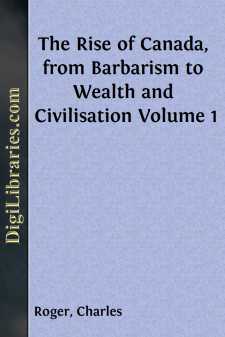Categories
- Antiques & Collectibles 13
- Architecture 36
- Art 48
- Bibles 22
- Biography & Autobiography 813
- Body, Mind & Spirit 142
- Business & Economics 28
- Children's Books 15
- Children's Fiction 12
- Computers 4
- Cooking 94
- Crafts & Hobbies 4
- Drama 346
- Education 46
- Family & Relationships 57
- Fiction 11828
- Games 19
- Gardening 17
- Health & Fitness 34
- History 1377
- House & Home 1
- Humor 147
- Juvenile Fiction 1873
- Juvenile Nonfiction 202
- Language Arts & Disciplines 88
- Law 16
- Literary Collections 686
- Literary Criticism 179
- Mathematics 13
- Medical 41
- Music 40
- Nature 179
- Non-Classifiable 1768
- Performing Arts 7
- Periodicals 1453
- Philosophy 64
- Photography 2
- Poetry 896
- Political Science 203
- Psychology 42
- Reference 154
- Religion 513
- Science 126
- Self-Help 84
- Social Science 81
- Sports & Recreation 34
- Study Aids 3
- Technology & Engineering 59
- Transportation 23
- Travel 463
- True Crime 29
The Rise of Canada, from Barbarism to Wealth and Civilisation Volume 1
by: Charles Roger
Description:
Excerpt
CHAPTER I.
There have been many attempts to discover a northwest passage to the East Indies or China. Some of these attempts have been disastrous, but none fruitless. They have all led to other discoveries of scarcely inferior importance, and so recently as within the past twelve months the discovery of a passage from the Atlantic to the Pacific Oceans has been made. It was in the attempt to find a new passage from Europe to Asia that this country was discovered. In one of these exploring expeditions, England, four centuries ago, employed John Cabot. This Italian navigator, a man of great intrepidity, courage, and nautical skill, discovered Newfoundland, saw Labrador, (only previously known to the Danes) and entered the Gulf of St. Lawrence. To Labrador he gave, it is alleged, the name of Primavista. But that he so designated that still rugged and inhospitable, but not unimprovable, region, is less than probable. The name was more applicable to the gulf which, doubtless, appeared to Cabot to be a first glimpse of the grand marine highway of which he was in quest, and with which he was so content that he returned to England and was knighted by Henry the Seventh. Sebastian Cabot made the next attempt to reach China by sailing northwest. He penetrated to Hudson's Bay, never even got a glimpse of the St. Lawrence, and returned to England. Fifty years afterwards, Cotereal left Portugal, with the view of following the course of the elder Cabot. He reached Labrador, returned to Portugal, was lost on a second voyage, and was the first subject of a "searching expedition," three vessels having been fitted out with that view by the King of Portugal. Several other attempts at discovery were subsequently made. Two merchants of Bristol, in England, obtained a patent to establish colonies in Newfoundland and Labrador, and in 1527, Henry the Seventh, for the last time, despatched a northwest passage discovery fleet. The formation of English settlements, and the exploration were equally unsuccessful. These facts I allude to, rather with the object of accounting for the name of "Canada," applied to the country through which the St. Lawrence flows, than for any other purpose. In the "Relations des Jesuits," Father Henepin states that the Spaniards first discovered Canada while in search, not of a northwest passage, but of gold, which they could not find, and therefore called the land, so valueless in their eyes, El Capo di Nada—"The Cape of Nothing." But, the Spaniards, who possibly did visit Canada two years before Cabot, whatever the object of their voyage may have been, could not have done anything so absurd. Quebec, not Canada, may have been to them Cape Nothing, and doubtless was. It was the way they looked for. That was as visible to them as to Cabot, and a passage, strath, or way is signified in Spanish by the word Canada. It was not gold but a way to gold that English, Spaniards, Italians, and French sought. It was the cashmeres, the pearls, and the gold of India that were wanted....


